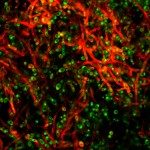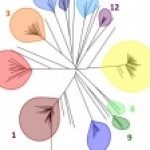Lien vers Pubmed [PMID] – 19059493
Fungal Genet. Biol. 2009 Feb;46(2):159-68
Candida albicans is a commensal and the most frequent fungal pathogen of humans. One mechanism of genetic variation in this diploid asexual yeast involves loss of heterozygosity (LOH). LOH events occur upon infection and contribute to the acquisition of antifungal resistance in patients. In contrast, little is known about the nature and extent of LOH events during commensalism. Using a combination of single nucleotide polymorphism typing, positional transcript profiling and karyotyping, we have characterized related C. albicans commensal isolates that differ by LOH events. Most of these LOH events encompassed the entirety of the chromosome or a large region extending to the telomere, suggesting chromosome loss or mitotic recombination/break-induced replication events, respectively. They were frequently accompanied by karyotype alterations such as chromosome length polymorphism and copy number variations at other chromosomes. These results demonstrate the high plasticity of the C. albicans genome during commensalism.






